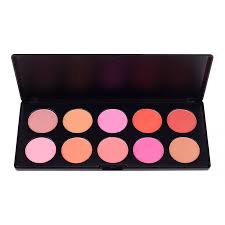blush
英 [blʌʃ]
美 [blʌʃ]
- vi. 脸红;感到惭愧
- n. 脸红;红色;羞愧
- vt. 红著脸表示;使成红色
- n. (Blush)人名;(英)布拉什
使用频率:

记忆方法
他不(b)拉(lu)屎(sh)憋得脸通红
中文词源
blush 脸红的
来自PIE *bhel, 发光,闪耀。指脸发红。词源同blaze, 明亮。
英语词源
- blush
-
blush: [OE] Modern English blush is a descendant of Old English blyscan ‘turn red, blush’, which was related to and perhaps derived from Old English blysa ‘firebrand, torch’. Similarities of form and meaning make it tempting to compare blaze, which meant ‘torch’ in Old English and came from a prehistoric Germanic *blasōn, but no connection has ever been established. Middle Dutch blosen ‘glow’ may be an intermediate form.
- blush (v.)
- mid-14c., bluschen, blischen, probably from Old English blyscan "blush, become red, glow" (glossing Latin rutilare), akin to blyse "torch," from Proto-Germanic *blisk- "to shine, burn," which also yielded words in Low German (Dutch blozen "to blush") and Scandinavian (Danish blusse "to blaze; to blush"); ultimately from PIE *bhel- (1) "to shine, flash, burn" (see bleach (v.)).
For vowel evolution, see bury. Earliest recorded senses were "to shine brightly; to look, stare." Sense of "turn red in the face" (with shame, modesty, etc.) is from c. 1400. Related: Blushed; blushing. - blush (n.)
- mid-14c., "a look, a glance" (sense preserved in at first blush), also "a gleam, a gleaming" (late 14c.), from blush (v.). As "a reddening of the face" from 1590s. Meaning "a rosy color" is 1590s.
权威例句
- 1. I felt myself blush. Then I sniffed back a tear.
- 我觉得自己的脸红了,接着我吸吸鼻子,不让眼泪掉下来。
- 2. I felt myself blush.
- 我不觉脸红了。
- 3. His remark brought a blush into the girl's cheeks.
- 他的话使这姑娘两颊红晕.
- 4. I have to blush to admit that thing.
- 我不得不羞愧地承认了那件事.
- 5. Her blush told of her embarrassment.
- 她脸红显露出她的困窘.